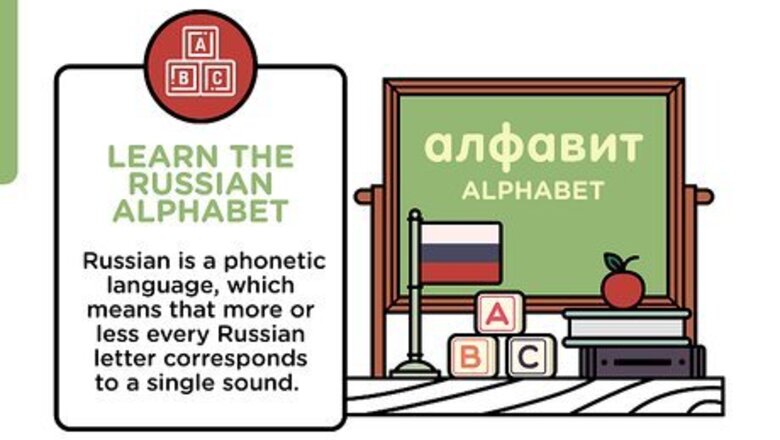
views
X
Research source
Here are some helpful ideas to aid you on the path to fluency.
Mastering the Basics
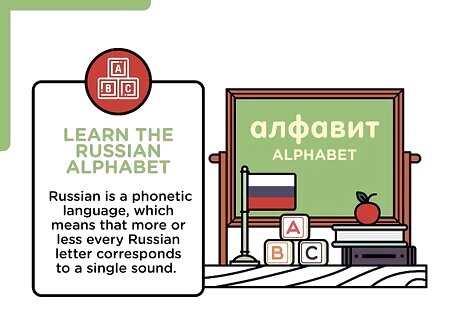
Learn the Russian alphabet. The alphabet is a good place to start when you're learning to speak Russian. Russian is a phonetic language, which means that more or less every Russian letter corresponds to a single sound. Once you have learned to pronounce every letter of the alphabet correctly, learn what other sounds the letters can make. For example, o can be a sometimes in Russian. The Russian alphabet is derived from the Cyrillic alphabet and consists of 33 letters, including 11 vowels, 20 consonants and 2 letters which make no sound, but make a word sound harder or softer. When learning, it might help to group the letters by look and sound, compared with their English counterparts: First Group: Written and pronounced the same. Six Russian letters are the same as English in both pronunciation and form—namely A, E, K, M, O, and T. Second Group: Look different but sound the same. Sixteen Russian letters have the same pronunciation as English ones but are symbolized by a completely different letter. These include Б, Г, Д, Ё, Ж, П, Ф, И, й, Л, Ц, Ш, Щ, Э, Ю and Я. Third Group: Look familiar but are pronounced differently. Eight Russian letters look very similar to some English letters and numbers but they are pronounced very differently—these are В, З, Н, Р, С, У, Ч, Х. Fourth Group: New letter and unfamiliar sound. There are some Russian letters which do not exist in English at all and either represent unfamiliar sounds or have no sound value—for example: Ы, Ъ, Ь. Mnemonics for the trickiest letters in the third group:В looks like the reels of a video tape, and sounds like one rewinding: V-v-v-v-v.Н sounds like N as in nail, and looks like two planks nailed together.Р is an R that has lost a leg and started Rolling downhill. (This sound is rolled in Russian.)У is a pair of fireworks about to launch; the crowd says oooo when it sees them.

Learn to count. Knowing how to count is an essential skill in any language. Learning Russian numbers can be tricky, as each number has six different forms, depending on how it's used. However, the nominative case is the most widely used and therefore the best place to start. Here's how to count to ten: One = один, pronounced "ah-DYEEN" [ɐˈdʲin] Two = два, pronounced "dva" [dva] Three = три, pronounced "tree" [trʲi] Four = четыре, pronounced "chi-TIH-rye" [t͡ɕɪˈtɨrʲe] Five = пять, pronounced "pyat" [pʲætʲ] Six = шесть, pronounced "shest" [ʂɛsʲtʲ] Seven = семь, pronounced "syem" [sʲemʲ] Eight = восемь, pronounced "VOH-syim" [ˈvosʲɪmʲ] Nine = девять, pronounced "DYEH-v'yit" [ˈdʲevʲɪtʲ] Ten = десять, pronounced "D'EH-syit" [ˈdʲesʲɪtʲ]
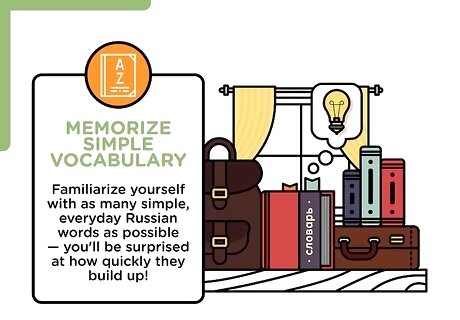
Memorize simple vocabulary. The wider the vocabulary you have at your disposal, the easier it is to speak a language fluently. Familiarize yourself with as many simple, everyday Russian words as possible—you'll be surprised at how quickly they build up! Attach little Russian labels to items around your house, such as the mirror, the coffee table, and the sugar bowl. This way, you'll remember the words better by associating them with the object they describe rather how they translate into English. It is important to learn a word or phrase from ‘Russian to English’ as well as ‘English to Russian.’ That way you will remember how to say it, not just recognize it when you hear it.
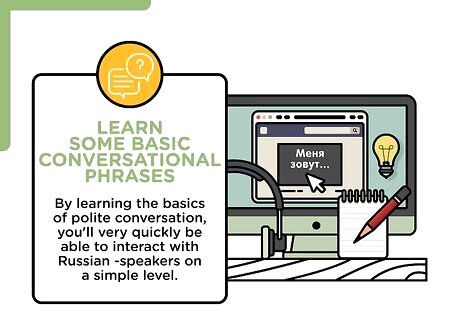
Learn some basic conversational phrases. By learning the basics of polite conversation, you'll very quickly be able to interact with Russian-speakers on a simple level. Try learning the words/phrases for: Hello = Здравствуйте, pronounced "ZDRAST-vooy-tye" [ˈzdrastvʊjtʲe] "'Hello (less formal)"' = Здравствуй , pronounced, "ZDRAST-vooy-tye" [ˈzdrastvʊj] Hi = Привет, pronounced "pree-VYET" [prʲɪˈvʲet] Yes = Да, pronounced "da" [da] No = Нет, pronounced "nyet" [nʲet] Thank you = Спасибо, pronounced "spuh-SEE-buh" [spɐˈsʲibə] Please = Пожалуйста, pronounced "pah-ZHAH-luh-stuh" [pɐˈʐalʊstə] My name is... = Меня зовут..., pronounced "men-ya za-voot" [mʲɪˈnʲa zɐˈvut] What is your name? = Как вас зовут? pronounced "kak vas za-voot" [ˈkak ˈvaz zɐˈvut] Pleased to meet you = Очень приятно, pronounced "och-en pree-yat-na" [ˈot͡ɕɪnʲ prʲɪˈjatnə] Okay = Хорошо, pronounced "ha-ra-sho" [xərɐˈʂo] Goodbye = До свидания, pronounced "da-svee-da-nee-ye" [də‿svʲɪˈdanʲɪjə] Keep in mind that when о is in an unstressed syllable, it is pronounced /ɐ/, which is a sound between о and а, but closer to а.
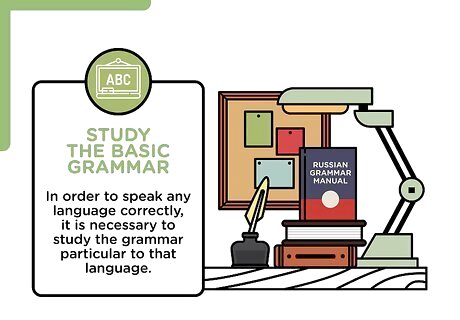
Study the basic grammar. In order to speak any language correctly, it is necessary to study the grammar particular to that language. Russian grammar can appear quite daunting to an English speaker at first, due to unfamiliar grammatical concepts such as gender and the case system. Don't let it put you off though, once you get the hang of the grammar you'll find that Russian is a very direct and expressive language! The case system. There are six main cases in the Russian Case System, the nominative, the accusative, the dative, the genitive, the instrumental, and the prepositional. To put it simply, a case is a set of endings that words take to indicate their function and relationship to other words in a sentence. Gender. Like many other languages, every noun in the Russian language is assigned a gender. Russian nouns are divided into three separate genders: masculine, feminine, and neuter (neutral). It's usually easy to tell the gender of a noun, as for people it's the same as the person's gender—for example, in Russian the word for father is masculine and the word for mother is feminine. However, with many other nouns gender is assigned arbitrarily - for example, the Russian word for "home" is masculine, while the Russian word for "door" is feminine. Fortunately for Russian language learners, most of the time you can tell the gender of a word by the letter or suffix it ends in. Verbs. One nice thing about Russian is that verbs have only 3 tenses—past, present, and future. Russian also has two aspects that are only used in the past and future tense—imperfective and perfective. Aspects determine whether an action is ongoing (imperfective) or has been completed (perfective). Russian verbs change their endings depending on the subject. Sometimes this happens in English, but not as much. (Example: I work, he works). There are two patterns of conjugation (or word endings) which are known as the first conjugation, and the second conjugation. There are also a number of irregular verbs that simply need to be learned.
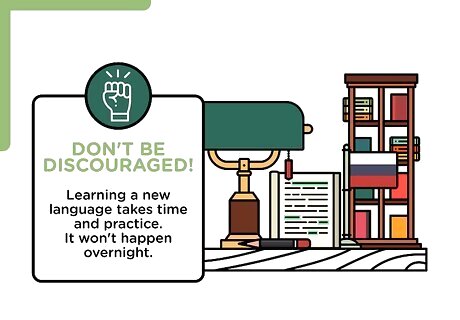
Don't be discouraged! If you're serious about learning to speak Russian, keep at it—the satisfaction you'll get from reaching milestones in a second language and eventually mastering it will far outweigh the difficulties you encounter along the way. Learning a new language takes time and practice. It won't happen overnight. If you still need some extra motivation, here are some things that make Russian easier to learn than other languages: Russian has only three tenses, much fewer than English. For example, in the past tense, they do not bother making a distinction between “I was running”, “I had been running”, or "I have been running". Russian does not use articles ("a" and "the"). Russian uses a much simpler sentence structure than English. In fact, it's usually possible to say exactly what you want in just a few succinct words. For example, in polite English you would need to use a long sentence like “can you please pass me the salt?” However in Russian it's just as polite to say something simple like “give salt please.”
Immersing Yourself in the Language

Find a native speaker. One of the best ways to improve your new language skills is to practice speaking with a native speaker. They will easily be able to correct any grammar or pronunciation mistakes you make and can introduce you to more informal or colloquial forms of speech that you won't find in a textbook. If you have a Russian speaking friend who is willing to help, that's great! Otherwise, you can place an ad in the local paper or online or investigate whether there are any pre-existing Russian conversation groups in the area. If you can't locate any Russian-speakers nearby, try finding someone on a chat application, such as Skype or Discord. They might be willing to exchange 15 minutes of Russian conversation for 15 minutes of English. Websites such as Italki can match you with someone willing to practice with you.
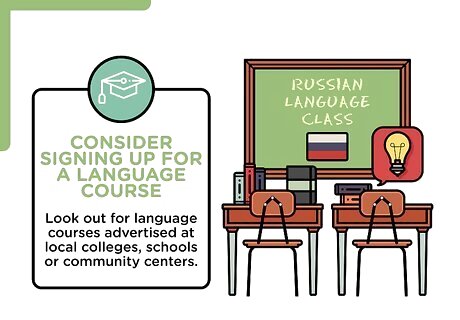
Consider signing up for a language course. If you need some extra motivation or feel you would learn better in a more formal setting, try signing up for a Russian language course. Look out for language courses advertised at local colleges, schools or community centers. If you're nervous about signing up for a class by yourself, drag a friend along. You'll have more fun and also someone to practice with between classes!
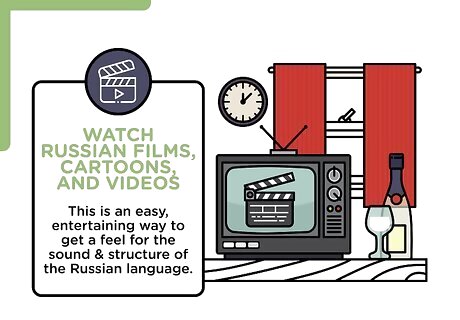
Watch Russian films, cartoons, and videos. Get your hands on some Russian DVDs (with subtitles), watch Russian cartoons online, or search YouTube for Russian-speaking YouTubers. This is an easy, entertaining way to get a feel for the sound and structure of the Russian language.
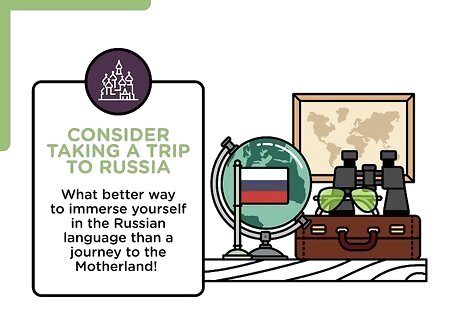
Once you feel comfortable with the basics of Russian speech, consider taking a trip to Russia or another Russian-speaking country. What better way to immerse yourself in the Russian language than a journey to the Motherland!










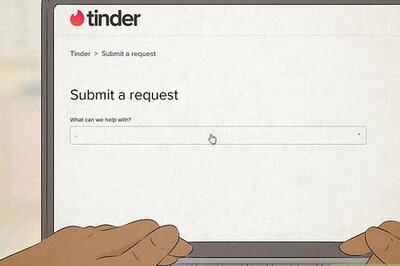









Comments
0 comment